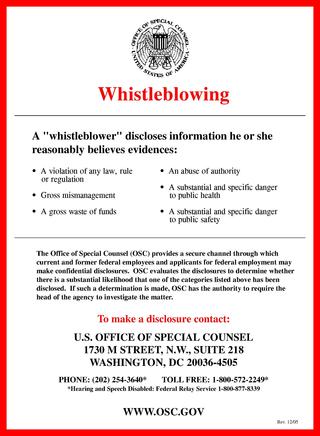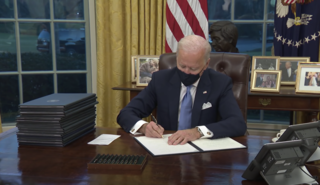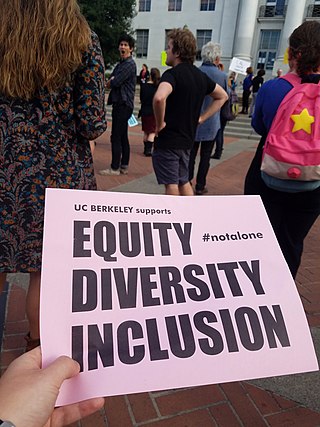
The Civil Rights Act of 1964 is a landmark civil rights and labor law in the United States that outlaws discrimination based on race, color, religion, sex, and national origin. It prohibits unequal application of voter registration requirements, racial segregation in schools and public accommodations, and employment discrimination. The act "remains one of the most significant legislative achievements in American history".

Executive Order 11246 was an executive order of the Article II branch of the U.S. Federal government, in place from 1965 to 2025, specifying non-discriminatory practices and affirmative action in federal government hiring and employment.

The Office of Federal Contract Compliance Programs (OFCCP) is part of the U.S. Department of Labor. OFCCP is responsible for ensuring that employers doing business with the federal government comply with the laws and regulations requiring nondiscrimination. This mission is based on the underlying principle that employment opportunities generated by Federal dollars should be available to all Americans on an equitable and fair basis.

The Rehabilitation Act of 1973 is a United States federal law, codified at 29 U.S.C. § 701 et seq. The principal sponsor of the bill was Rep. John Brademas (D-IN-3). The Rehabilitation Act of 1973 replaces preexisting laws to extend and revise the authorization of grants to States for vocational rehabilitation services, with special emphasis on services to those with the most severe disabilities, to expand special Federal responsibilities and research and training programs with respect to individuals with disabilities, to establish special responsibilities in the Secretary of Health, Education, and Welfare for coordination of all programs with respect to individuals with disabilities within the Department of Health, Education, and Welfare, and for other purposes. It created the Rehabilitation Services Administration.

Equal employment opportunity is equal opportunity to attain or maintain employment in a company, organization, or other institution. Examples of legislation to foster it or to protect it from eroding include the U.S. Equal Employment Opportunity Commission, which was established by Title VII of the Civil Rights Act of 1964 to assist in the protection of United States employees from discrimination. The law was the first federal law designed to protect most US employees from employment discrimination based on that employee's race, color, religion, sex, or national origin.

In the United States, affirmative action consists of government-mandated, government-approved, and voluntary private programs granting special consideration to groups considered or classified as historically excluded, specifically racial minorities and women. These programs tend to focus on access to education and employment in order to redress the disadvantages associated with past and present discrimination. Another goal of affirmative action policies is to ensure that public institutions, such as universities, hospitals, and police forces, are more representative of the populations they serve.
Employment discrimination law in the United States derives from the common law, and is codified in numerous state, federal, and local laws. These laws prohibit discrimination based on certain characteristics or "protected categories". The United States Constitution also prohibits discrimination by federal and state governments against their public employees. Discrimination in the private sector is not directly constrained by the Constitution, but has become subject to a growing body of federal and state law, including the Title VII of the Civil Rights Act of 1964. Federal law prohibits discrimination in a number of areas, including recruiting, hiring, job evaluations, promotion policies, training, compensation and disciplinary action. State laws often extend protection to additional categories or employers.
Executive Order 10925, signed by President John F. Kennedy on March 6, 1961, required government contractors, except in special circumstances, to "take affirmative action to ensure that applicants are employed and that employees are treated during employment without regard to their race, creed, color, or national origin". It established the President's Committee on Equal Employment Opportunity (PCEEO), which was chaired by then Vice President Lyndon Johnson. Vice Chair and Secretary of Labor Arthur Goldberg was responsible for the "general supervision and direction" of the Committee's operations. Ten other senior executive appointees also sat on the Committee.

E-Verify is a United States Department of Homeland Security (DHS) website that allows businesses to determine the eligibility of their employees, both U.S. and foreign citizens, to work in the United States. The site was originally established in 1996 as the Basic Pilot Program to prevent companies from hiring people who had violated immigration laws and entered the United States illegally. In August 2007, the DHS started requiring all federal contractors and vendors to use E-Verify. The Internet-based program is free and maintained by the United States government. While federal law does not mandate use of E-Verify for non-federal employees, some states have mandated use of E-Verify or similar programs, while others have discouraged the program.
A protected group, protected class (US), or prohibited ground (Canada) is a category by which people are qualified for special protection by a law, policy, or similar authority. In Canada and the United States, the term is frequently used in connection with employees and employment and housing. Where illegal discrimination on the basis of protected group status is concerned, a single act of discrimination may be based on more than one protected class. For example, discrimination based on antisemitism may relate to religion, ethnicity, national origin, or any combination of the three; discrimination against a pregnant woman might be based on sex, marital status, or both.

Executive Order 11375, signed by President Lyndon B. Johnson on October 13, 1967, banned discrimination on the basis of sex in hiring and employment in both the United States federal workforce and on the part of government contractors.

A whistleblower is a person who exposes any kind of information or activity that is deemed illegal, unethical, or not correct within an organization that is either private or public. The Whistleblower Protection Act was made into federal law in the United States in 1989.
The Fair Employment Practice Committee (FEPC) was created in 1941 in the United States to implement Executive Order 8802 by President Franklin D. Roosevelt "banning discriminatory employment practices by Federal agencies and all unions and companies engaged in war-related work." That was shortly before the United States entered World War II. The executive order also required federal vocational and training programs to be administered without discrimination. Established in the Office of Production Management, the FEPC was intended to help African Americans and other minorities obtain jobs in home front industries during World War II. In practice, especially in its later years, the committee also tried to open up more skilled jobs in industry to minorities, who had often been restricted to lowest-level work. The FEPC appeared to have contributed to substantial economic improvements among black men during the 1940s by helping them gain entry to more skilled and higher-paying positions in defense-related industries.

The Copeland "Anti-kickback" Act is a U.S. labor law and act of Congress that supplemented the Davis–Bacon Act of 1931. It prohibits a federal building contractor or subcontractor from inducing an employee into giving up any part of the compensation that he or she is entitled to under the terms of his or her employment contract. The Copeland Act also incorporated provisions of President Hoover's executive order no. 5778, requiring employers to file weekly compliance reports.
Executive Order 13672, signed by U.S. President Barack Obama on July 21, 2014, amended two earlier executive orders to extend protection against discrimination in hiring and employment to additional classes. It prohibited discrimination in the civilian federal workforce on the basis of gender identity and in hiring by federal contractors on the basis of both sexual orientation and gender identity.

The Equal Employment Opportunity Act of 1972 is a United States federal law which amends Title VII of the Civil Rights Act of 1964 to strengthen protections against employment discrimination. It prohibits discrimination in the workplace based on race, color, national origin, sex, religion, age, disability, and marital or familial status. Specifically, it empowers the Equal Employment Opportunity Commission to take enforcement action against individuals, employers, and labor unions which violated the employment provisions of the 1964 Act, and expanded the jurisdiction of the commission as well. It also requires employers to make reasonable accommodation for the religious practices of employees.
Endo refers to a short-term de facto employment practice in the Philippines. It is a form of contractualization which involves companies giving workers temporary "employment" that lasts for less than six months and then terminating their employment just short of being regularized in order to skirt on the costs which come with the benefits of regularization. Some examples of such are the benefits of having a de jure "employer-and-employee relationship"-mandated SSS, Philhealth, and Pag-ibig housing fund contribution, paid time-off (leaves), and a 13th-month pay, among others.

Proposition 16 was a failed California ballot proposition that appeared on the November 3, 2020, general election ballot, asking California voters to amend the Constitution of California to repeal Proposition 209 (1996). Proposition 209 amended the state constitution to prohibit government institutions from considering race, sex, or ethnicity, specifically in the areas of public employment, public contracting, and public education. Therefore, Proposition 209 banned the use of race- and gender-based affirmative action in California's public sector and public university admissions.

Executive Order 13988, officially titled Preventing and Combating Discrimination on the Basis of Gender Identity or Sexual Orientation, was the fourth executive order signed by U.S. President Joe Biden on January 20, 2021. It was rescinded by Donald Trump within hours of his assuming office on January 20, 2025.

Diversity, equity, and inclusion (DEI) are organizational frameworks which seek to promote the fair treatment and full participation of all people, particularly groups who have historically been underrepresented or subject to discrimination on the basis of identity or disability. These three notions together represent "three closely linked values" which organizations seek to institutionalize through DEI frameworks. The concepts predate this terminology and other variations sometimes include terms such as belonging, justice, and accessibility. As such, frameworks such as inclusion and diversity (I&D), diversity, equity, inclusion and belonging (DEIB), justice, equity, diversity and inclusion, or diversity, equity, inclusion and accessibility exist.










